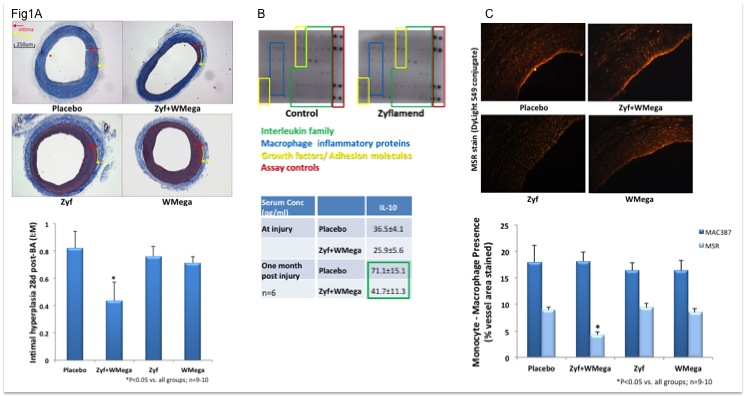Back to 2017 Annual Meeting Posters
Zyflamend+Wholemega Fatty Acid Combinatorial Dietary Supplement Therapy Inhibits Intimal Hyperplasia via the Attenuation of M2 Macrophage Differentiation in a Rodent Model of Vascular Injury
Katherine Warner1, Michael Ryan Buckley1, Deidra JH Mountain1, Stacy S Kirkpatrick1, Jay Whelan2, Paul D Terry1, Mitchell H Goldman1, Michael B Freeman1, Oscar H Grandas1
1University of Tennessee Graduate School of Medicine, Knoxville, TN;2University of Tennessee, Knoxville, TN
Background: Intimal hyperplasia (IH) development is thought to be heavily regulated by an immune-mediated reaction. While intimal migration and proliferation of medial vascular smooth muscle cells are the basis of lesion formation, recent evidence has shown that monocyte/macrophage vessel infiltration is an independent predictor of restenosis. Inflammatory macrophages can be alternatively differentiated to an M2 phenotype under the stimuli of interleukin (IL)-family cytokines, where they may serve as precursors to neointimal myofibroblasts and contribute to excess matrix deposition and vessel fibrosis. We have previously demonstrated the combination of Zyflamend (Zyf) + Wholemega (WMega) fatty acid dietary supplementation to be protective against IH in an animal model of vascular injury. Here we examined the role of Zyf and WMega independently and in a combinatory drug regimen in inflammatory-dependent vascular remodeling mechanisms and macrophage phenotypic differentiation, with the goal of elucidating their vascular protective mechanisms of action.
Methods: The diets of aged (8-10 month) male rats were supplemented with human equivalent doses of Zyf, WMega, or Zyf+WMega prior to balloon angioplasty-induced injury of the right carotid artery. Serum was collected pre- and post-supplementation for cytokine analysis via qualitative and quantitative multiplex array. Carotid tissue was collected 28d post-injury, stained with trichrome elastin for intima:media (I:M) quantification, and with isoform-specific antibodies for matrix metalloproteinase (MMP) remodeling enzymes, proliferating cellular nuclear antigen (PCNA), monocyte/macrophage infiltration (MAC387), and macrophage scavenger receptor (MSR), a marker of M2 differentiated macrophages.
Results: I:M was decreased in Zyf+WMega animals compared to placebo (0.43±0.14 vs. 0.82±0.12, n=9-10, P<0.05; Fig1A) while neither Zyf (0.76±0.07) or WMega (0.71±0.04) independently had a significant effect. Injury-induced interleukin family isoforms, interferon-γ, and macrophage inflammatory proteins were downregulated by Zyf+WMega. Specifically interleuin-10 (IL-10) was notably decreased in the serum of Zyf+WMega animals compared to placebo (Fig1B). While MMPs, PCNA, and MAC387 were not affected in the tissue of any group, the presence of MSR was significantly downregulated in the tissue of Zyf+WMega animals (4.3±0.5%*) compared to all other groups (Placebo 9.0±0.6, Zyf 9.4±0.9, WMega 8.5±0.7%; *P<0.05; Fig1C).
Conclusions: Daily combinatorial dietary supplement administration of Zyflamend+Wholemega fatty acids inhibited IH development in vivo, while neither Zyflamend or Wholemega administration were independently effective. Furthermore, Zyf+WMega supplementation attenuated the acute inflammatory response following injury. Decreased IL-10 levels, a potent anti-inflammatory cytokine and known stimulus of M2 macrophage differentiation, may play a central role in the protective effect of the combination. While overall monocyte/macrophage vessel infiltration was not affected, Zyf+WMega did decrease the presence of alternately differentiated M2 phenotype in the vessel wall. Ongoing studies are evaluating the role Zyf+WMega in the regulation of M2-derived myofibroblast differentiation and the subsequent downstream attenuation of matrix deposition-induced fibrosis as a possible mechanism for Zyf+WMega controlling IH. Additionally, future clinical investigations will examine Zyf+WMega fatty acid combinatorial supplementation as a therapeutic anti-inflammatory agent in the prevention of vascular disease progression.

Back to 2017 Annual Meeting Posters




